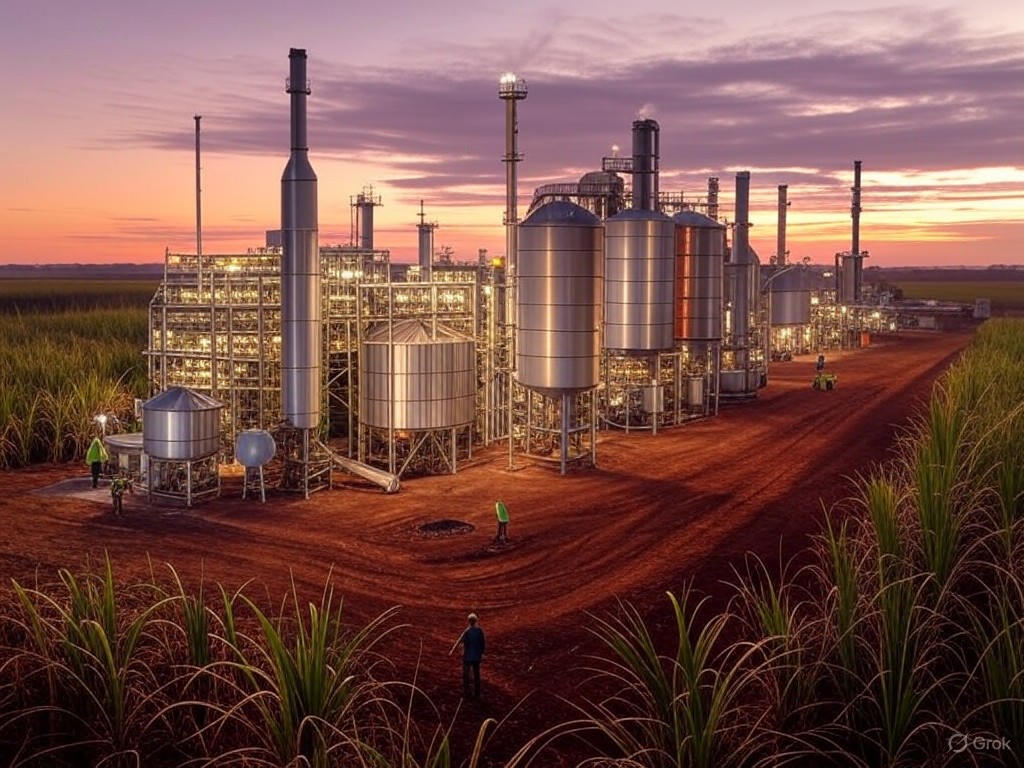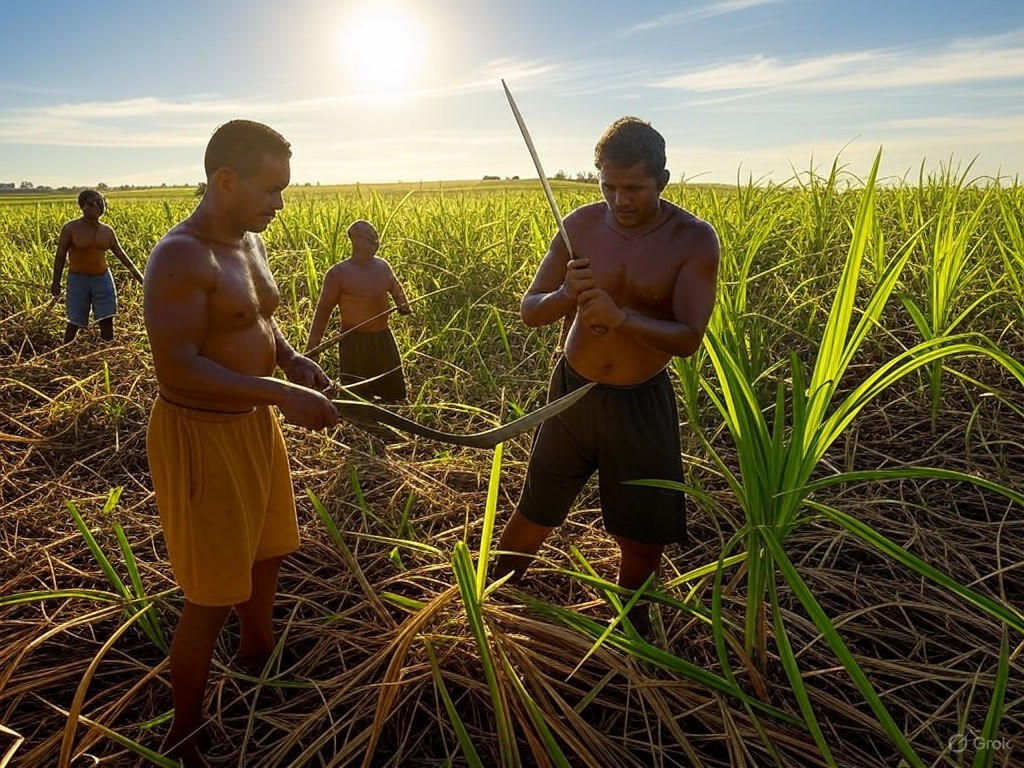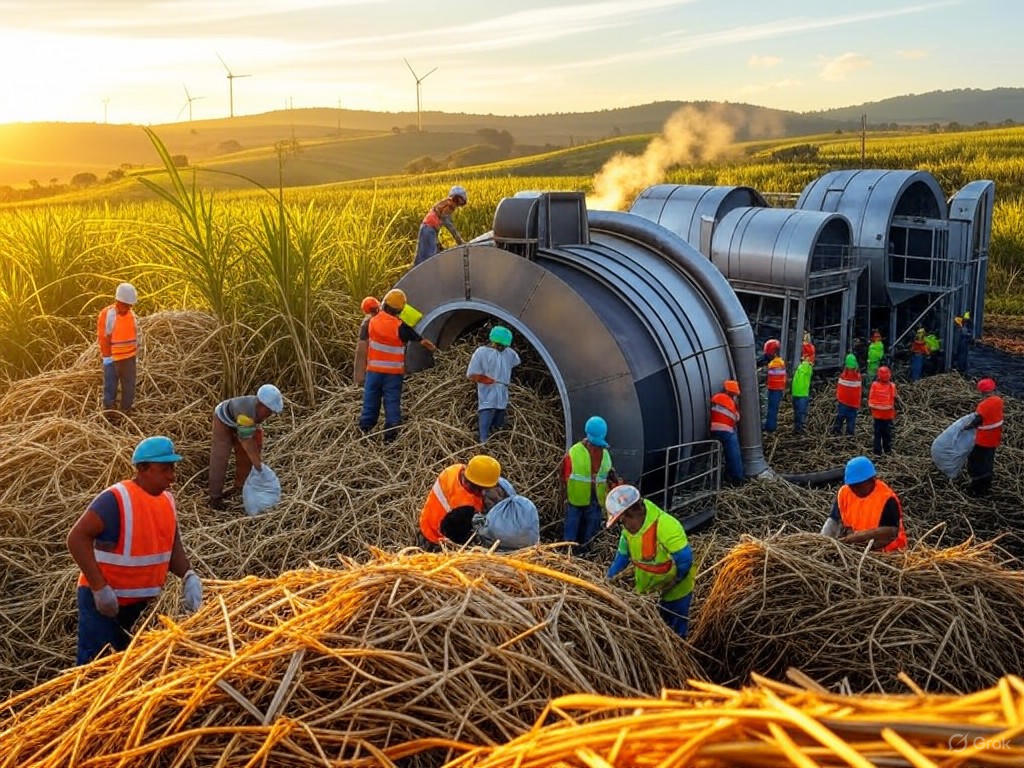Bioenergy in Brazil: Sustainable Fuel
In the vast expanse of Brazil's sun-kissed fields, where the earth yields its bounty and the winds carry echoes of ancient rhythms, a quiet transformation unfolds. Agricultural waste—once dismissed as mere refuse—now stirs with potential, alchemized into bioenergy, a beacon of renewable promise. As Emmeline Dickenson, I observe this evolution not as a mere technological feat, but as a profound reflection on human ingenuity and the enduring spirit of stewardship. Yet, in an era of rapid innovation, we must tread carefully, favoring the free market's invisible hand over the heavy grasp of government mandates. Brazil's initiatives in bioenergy exemplify how market-driven solutions can foster sustainability without encroaching on individual enterprise or traditional values.
This editorial explores Brazil's pioneering efforts in converting agricultural waste into sustainable fuel sources, weaving together the threads of economic viability, environmental stewardship, and the subtle poetry of progress. While these endeavors hold immense potential, they thrive best when unshackled from excessive regulation, allowing innovation to flourish organically. Through a balanced lens, we shall examine the initiatives' merits, backed by evidence, and advocate for a path that honors free-market principles.
The Genesis of Bioenergy: A Market-Born Miracle
Brazil's bioenergy landscape emerges from the fertile soils of necessity and innovation, particularly in regions where sugarcane and other crops dominate. Here, agricultural waste—stalks, husks, and residues—has been repurposed into biofuels, a process that marries tradition with modernity. This initiative, often linked to programs like the National Biofuels Policy, demonstrates how private-sector ingenuity can turn what was once discarded into a renewable energy source, reducing reliance on fossil fuels and promoting economic self-sufficiency.
At its core, bioenergy represents a free-market triumph. Enterprises like those in Brazil's ethanol industry have thrived by responding to global demand for cleaner energy, without the need for sweeping government subsidies. According to a Wall Street Journal analysis, Brazil's bioenergy sector has grown exponentially, contributing to a 10% reduction in greenhouse gas emissions from transportation since 2010, all while creating jobs in rural communities. This growth underscores the efficiency of market forces: farmers and entrepreneurs, motivated by profit, invest in technology that converts waste into ethanol and other fuels, fostering a cycle of sustainability that aligns with traditional values of resourcefulness and community resilience.
Yet, this progress is not without its challenges. Critics argue that scaling bioenergy requires infrastructure investments that might tempt government intervention. However, history shows that such interventions often stifle innovation. Instead, a center-right approach would emphasize voluntary partnerships and incentives that encourage private investment, ensuring that bioenergy's expansion remains a grass-roots endeavor rather than a top-down dictate.

A processing plant in Brazil's countryside at dusk, where agricultural waste is transformed into bioenergy, symbolizing the quiet rebirth of resources under the stars.
Analyzing the Economic and Environmental Tapestry
Delving deeper, the economic fabric of Brazil's bioenergy initiatives reveals a intricate weave of benefits and balances. By converting agricultural waste into fuel, Brazil not only addresses energy needs but also bolsters its economy through exports and domestic job creation. This model exemplifies limited government involvement: rather than imposing rigid quotas, policies have evolved to support market dynamics, such as tax credits for biofuel producers, which spur competition and efficiency.
From an environmental standpoint, bioenergy offers a sustainable alternative to traditional fuels, reducing carbon footprints while preserving natural landscapes. A study from IEEE Spectrum highlights how Brazil's use of sugarcane bagasse—a byproduct of sugar production—has made it a global leader in renewable energy, powering homes and vehicles with emissions far lower than those of petroleum. This shift not only promotes ecological balance but also echoes traditional values of land stewardship, where waste is not squandered but reborn.
However, a balanced view requires acknowledging potential pitfalls. The rapid expansion of bioenergy crops could strain water resources or compete with food production, as noted in a report from the International Energy Agency. Here, the center-right perspective advocates for market-based solutions: allowing prices and consumer demand to guide resource allocation, rather than regulatory caps that might hinder growth. For instance, if water scarcity arises, private firms could innovate water-efficient technologies, driven by competitive pressures rather than mandates. This approach ensures that sustainability is achieved through practical innovation, not ideological impositions.
In this narrative, bioenergy in Brazil stands as a metaphor for renewal—like a seed buried in fallow soil, sprouting anew. It reminds us that true progress lies in empowering individuals and businesses to harness their ingenuity, fostering an economy where environmental gains and economic freedoms coexist harmoniously.

Workers in Brazil's sugarcane fields, harvesting crops that will yield bioenergy, illustrating the human element in sustainable fuel production amid golden horizons.
Evidence and the Path Forward: Weaving Data into Wisdom
To substantiate these observations, consider the empirical evidence from credible sources. The Energy Institute's blog reports that Brazil produced over 30 billion liters of ethanol in 2022, with bioenergy accounting for more than 45% of the country's renewable energy mix. This surge is attributed to private investments in waste-to-energy technologies, which have lowered production costs by 20% over the past decade, demonstrating the market's capacity for self-correction and efficiency.
Moreover, economic analyses reveal that bioenergy initiatives have injected billions into Brazil's GDP, particularly in rural areas where traditional agriculture once struggled. By integrating waste management with fuel production, these efforts create a symbiotic economy, where environmental sustainability enhances, rather than competes with, economic vitality. Yet, as a World Bank report cautions, overreliance on government-backed programs could lead to inefficiencies, underscoring the need for a restrained regulatory approach.
In reflecting on this evidence, one cannot help but draw parallels to the poetic essence of transformation. Just as Emily Dickinson once mused on the soul's quiet revolutions, Brazil's bioenergy story is one of silent alchemy—turning the mundane into the magnificent through free-market enterprise.
Conclusion: A Harvest of Hope, Tempered by Prudence
As the sun sets on Brazil's expansive fields, the whispers of bioenergy linger, a testament to what can be achieved when innovation is left to the market's gentle guidance. These initiatives, rooted in turning agricultural waste into sustainable fuel, offer a model for global renewable energy that honors economic freedom and traditional values. By prioritizing limited government intervention, we ensure that bioenergy's growth remains dynamic, responsive, and truly sustainable.
Yet, this path demands vigilance. Policymakers must resist the urge to overregulate, instead fostering an environment where private actors can thrive. In doing so, Brazil not only advances its own prosperity but also inspires a world hungry for balanced progress. Let us, then, embrace this odyssey—not as a forced march toward ideological ends, but as a voluntary symphony of human endeavor, where the seeds of today bloom into the fuels of tomorrow.

